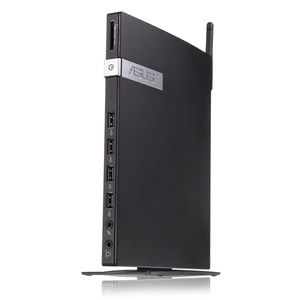ASUS EeeBox Specific Notes: Difference between revisions
(Temporarily set the TC1 link statically until someone who can edit the templates better can fix the URL.) |
|||
| Line 51: | Line 51: | ||
Save and exit. You can now install the OS via PXE. If you plan to leave this machine on a network with an existing PXE server, be sure the change the boot priority to put PXE at the bottom of the list after you finish the install. | Save and exit. You can now install the OS via PXE. If you plan to leave this machine on a network with an existing PXE server, be sure the change the boot priority to put PXE at the bottom of the list after you finish the install. | ||
== Model EB1036 == | == Model EB1036 == | ||
Revision as of 02:07, 1 May 2015

Alteeve's Niche! generally uses ASUS EeeBox micro PCs as AN!CDB Cluster Dashboards. This page explains how we configure them for this role.
ASUS EeeBox Specific Notes
This section is mainly for our use, but it might prove useful to anyone looking to use the same hardware for the cluster monitor machine.
Model EB1033
BIOS
Press <F2> at boot to enter setup.
- Advanced > APM > Resore AC Power Loss = Last State
- Advanced > Onboard Devices Configuration > Onboard WLAN = Disabled
- Advanced > Onboard Devices Configuration > Onboard Audio = Disabled
- Boot > Full Screen Logo = Disabled
Save and exit. You can now install the OS via PXE. If you plan to leave this machine on a network with an existing PXE server, be sure the change the boot priority to put PXE at the bottom of the list after you finish the install.
OS Install Notes
The internal hard drives shows up as /dev/sdb, so update any kickstart scripts you use accordingly.
Once a minimal OS install is complete, run, follow these tutorials;
Model EB1021
BIOS
Press <F2> at boot to enter setup.
- Advanced > ACPI Settings > Enable Hibernation = Disabled
- Advanced > ACPI Settings > ACPI Sleep State = Suspend Disabled
- Advanced > Onboard Devices Configuration > Realtek PXE OPROM = Enables
- Advanced > South Bridge > SB SATA Configuration > OnChip SATA Type = AHCI
- Advanced > APM > Restore AC Power Loss = Last State
Save, reboot and re-enter the BIOS (needed to add 'PXE boot' to the boot options).
- Boot > Setup Prompt Timeout = 5
- Boot > Full Screen Logo = Disabled
- Boot > Boot Option #1 = Realtek PXE B02 D00
Save and exit. You can now install the OS via PXE. If you plan to leave this machine on a network with an existing PXE server, be sure the change the boot priority to put PXE at the bottom of the list after you finish the install.
Model EB1036
BIOS
Press <F2> at boot to enter setup.
- Advanced > CPU Configuration > Power Technology = Disabled
- Advanced > South Bridge > Azalia HD Audio = Disabled
- Advanced > South Bridge > Restore AC Power Loss = Power On
- Advanced > Network Stack Configuration > Network Stack = Enabled
- Advanced > Network Stack Configuration > Ipv6 PXE Support = Disabled
- Advanced > Onboard Device Configuration > Realtek PXE OPROM = Enabled
- Advanced > Onboard Device Configuration > Wireless LAN (Radio On/Off) = Disabled
- Advanced > APM > Restore AC Power Loss = Power On
Save, reboot and re-enter the BIOS (needed to add 'PXE boot' to the boot options).
- Boot > Fast Boot = Disabled
- Boot > Boot Logo Display = Disabled
- Boot > Wait for 'F1' If Error = Disabled
- Boot > Secure Boot Menu > OS Type = Other OS
- Boot > Boot Option #1 = PO: TOSHIBA <serial>
- Boot > Boot Option #2 = UEFI OS (P0: <drive>)
- Boot > Boot Option #3 = Realtek PXE BO2 DOO
- Boot > Boot Option #4 = Disabled
- Boot > Boot Option #5 = Disabled
- Boot > Boot Option #6 = Disabled
Save and exit. You can now install the OS via PXE. If you plan to leave this machine on a network with an existing PXE server, be sure the change the boot priority to put PXE at the bottom of the list after you finish the install.
OS Install Notes
The internal hard drives shows up as /dev/sdb, so update any kickstart scripts you use accordingly.
Once a minimal OS install is complete, run, follow these tutorials;
| Any questions, feedback, advice, complaints or meanderings are welcome. | |||
| Alteeve's Niche! | Enterprise Support: Alteeve Support |
Community Support | |
| © Alteeve's Niche! Inc. 1997-2024 | Anvil! "Intelligent Availability®" Platform | ||
| legal stuff: All info is provided "As-Is". Do not use anything here unless you are willing and able to take responsibility for your own actions. | |||